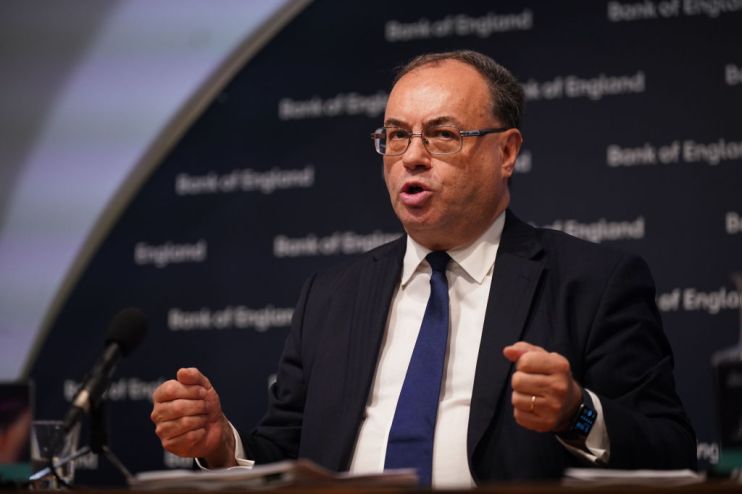More jumbo Bank of England rate hikes on a knife edge if UK tips into long recession

More super-sized rate hikes in the coming months from the Bank of England are on a knife edge if the economy slumps into a prolonged recession, City economists are betting.
Consumers and businesses may struggle to absorb further 50 basis point rate rises, likely prompting the Bank to slowdown its rate hike cycle, experts said after today’s historic rate announcement.
The Bank said the UK will tip into recession in the final three months of this year and stay there until the end of 2023, which would be the longest downturn since the financial crisis.
That slump and the biggest inflation spike since 1980, peaking at over 13 per cent, will squeeze households’ budgets and businesses’ bottom lines, meaning even more rate hikes could deal irreparable damage to the UK economy.
It raised rates 50 basis points, the largest increase in nearly 30 years, to 1.75 per cent, meaning it has lifted borrowing costs while also forecasting a recession, a rarity.
“It is hard to call the September decision. We see another coin toss decision between a 25 basis point and a 50 basis point hike, but we stick to our call of a 25 basis point move, on balance,” analysts at Morgan Stanley said.
“The MPC’s report presented ‘the good, the bad and the ugly’ in terms of the economic outlook, with the tone very much resembling the mood of the early 1980s and the economy showing clear signs of stagflation,” Barret Kupelian, senior economist at PwC, said.
But, James Smith, developed market economist at Dutch bank ING, disagreed, saying “there’s a strong possibility of another 50 basis point hike in September – particularly if that’s what both the Fed and European Central Bank end up doing too”.
The Bank said it will act “forcefully” in response to intensifying inflationary pressures, a commitment it also made at its last policy meeting in June which eventually translated into a 50 basis point hike today.
The Fed has lifted rates 225 basis points since March, the fastest tightening cycle since the early 1980s, while the ECB shocked markets last month by marking its first rate hike in over a decade with a 50 basis point rise.
“The Bank of England and its peers are trying to catch up with far more powerful inflationary pressures than they had expected at the start of this year,” Ian Stewart, chief economist at Deloitte, said.
Smith also noted that price pressures are beginning to ease, raising the chances of smaller increases through the rest of the year. Core inflation, a more accurate measure of underlying inflation, has dropped two months in a row.
But, former rate setters said governor Andrew Bailey and the rest of the MPC are now having to appease investors by delivering on market expectations instead of being guided by their own judgements.
“The MPC should be driving events, not being at the beck and call of the markets. It’s really quite a worrying situation,” Andrew Sentance, a former member of the MPC and now an advisor to Cambridge Econometrics, told City A.M.
Sentance wanted the Bank to lift borrowing costs 75 basis points today. He thinks rates need to hit somewhere between three and four per cent.